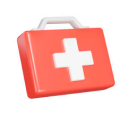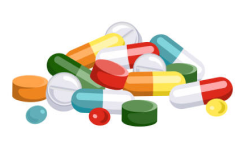Uses
What is Duloxetine for?
Duloxetine belongs to a class of medications known as the Serotonin and Noradrenaline Reuptake Inhibitors (SNRI). It is used to treat symptoms of depression (low mood) such as:
- Feeling sad
- Feeling hopeless or useless
- Feeling bad about yourself
- Thoughts of ending your life
- Poor sleep, energy or appetite
It may also be used to treat symptoms of anxiety such as:
- Feeling constantly worried and helpless
- Very fast heartbeat
- Uncontrolled shaking of body parts such as hands (tremors)
- Sweating
- Nervousness
Duloxetine may be used to reduce nerve pain in patients with diabetes, urinary incontinence (unable to control urine from leaking out) or for other conditions. Check with your healthcare professional if you are unsure why you are given this medication.
How should I take or use Duloxetine?
- Duloxetine may be taken with or without food. Swallow the capsule whole, do NOT open, chew or crush it
- Take your medication according to the instructions stated on the medication label
- Do not stop taking or adjust the dose of this medication without checking with your doctor
- Duloxetine needs to be taken regularly for a few weeks before you can feel its full benefits. You should not stop taking this medication even if you do not feel better at the beginning. Continue to take this medication even after you feel better to prevent your symptoms from returning
- Do check with your doctor on how long you will have to be on this medication
- You may experience unpleasant effects such as dizziness, headache, difficulty sleeping, irritability, and nausea if you suddenly stop taking the medication on your own
What should I do if I forget to take or use Duloxetine?
- If you forget to take a dose, take it as soon as you remember. However, if more than half of the time to the next dose, skip the missed dose and take the next dose at the usual timing.
- For example, for a medication to be taken two times daily at 8am and 8pm, and you missed your first dose at 8am, skip the first dose if it is after 2pm, and take your second dose at the usual timing at 8pm. Do not take two doses to make up for the missed dose.
Precaution
What precautions should I take when taking or using Duloxetine?
Inform your healthcare professional if:
- You are allergic to this medication or any of the other ingredients of this medication
- You are pregnant, planning to become pregnant, or breastfeeding. If you are pregnant or breastfeeding, your doctor would have discussed the potential benefits and side-effects with you and should you have further questions or concerns, do consult your doctor
- You are taking any other medications (including those that can be bought without a prescription), supplements such as St John’s Wort, traditional Chinese medicine and herbal products. Some of them may affect how this medication works or cause serious drug interactions
- You have or have ever had:
- Other drug allergies
- Heart, kidney or liver disease
- Medical conditions such as high blood pressure, seizures (fits), Parkinson’s disease, increased eye pressure (glaucoma), low sodium in the blood (hyponatremia) or bleeding problems
- Other mental health conditions such as bipolar disorder, abnormally high or excited mood (mania)
- Been taking other medication for your low mood in the past 2 weeks.
Duloxetine may increase your blood pressure. It is important to keep regular check-ups with your doctor.
What food or medication should I avoid when I take or use Duloxetine?
Avoid drinking alcohol while taking Duloxetine as it can worsen the symptoms of your depression and cause excessive sleepiness.
Side Effects
What are some common side effects of Duloxetine?
The mentioned side effects generally affect up to 10% of patients.
- Nausea, vomiting or loss of appetite
- Take the medication with or after food.
- Take small but more frequent meals, and avoid fatty or spicy food.
- Difficulty sleeping
- Discuss with your doctor if you can take your medication at a different time of the day
- Listen to relaxing music at bedtime
- Avoid eating or drinking too much before bedtime
- Limit caffeine intake (such as coffee, tea or energy drinks) at least 8 hours before bedtime
- Drowsiness or feeling tired
- Avoid driving or taking part in activities that requires concentration.
- Discuss with your doctor if you can take your medication at a different time of the day.
- Dry mouth
- Chew sugar-free gum, suck on sugar-free hard candies or ice chips, and sip water regularly
- Constipation
- Drink more water (if you do not have any fluid restriction), eat more high- fibre foods, and exercise regularly
- Speak to your doctor or pharmacist if you need medication to help with your constipation
- Diarrhoea
- Drink plenty of water to replace the loss of fluids
- Dizziness
- Get up slowly from a sitting or lying down position
- Mild nervousness
- May occur at the start of treatment but usually improves over time with continued medication taking
- Headache, loss of appetite, weight loss, increased blood pressure, increased sweating, decreased sexual drive or ability
Most of the side effects listed here will improve with time. Speak with your doctor if they continue, get worse or are affecting your daily life.
What are some rare but serious side effects that I need to seek medical advice immediately?
The symptoms of a drug allergy include one or more of the following:
- Swollen face/eyes/lips/tongue
- Difficulty in breathing
- Itchy rashes on your skin over your whole body
Rarely this medication may cause:
- Seizures (fits)
- Unexplained fever, confusion, fast heartbeat, severe weakness, uncontrolled movements or twitching of muscles (signs and symptoms of serotonin syndrome)
- Very bad agitation or confusion
- Loss of appetite, severe nausea or vomiting, pain in the upper part of the stomach, yellowing of the skin or ‘whites’ of the eyes, dark-brown coloured urine and/or pale/clay-coloured stools (signs and symptoms of liver problem)
- Unusual thoughts, talking, feeling, and acting with excitement that you cannot control (signs and symptoms of mania)
- Unusual bruising or bleeding
- Blurred vision
- Feeling confused, muscle weakness/cramps, difficulty in concentrating or remembering things, feeling unsteady when walking (signs and symptoms of low sodium in the blood)
If you experience any of these symptoms, you should stop your medication and see your healthcare professional immediately.
IMPORTANT:
In some cases, particularly in young people below the age of 25 years, this medication may cause the following changes to a person’s mental condition, especially in the first few weeks of treatment or during dose changes:
- New or worsening thoughts of harming yourself or ending your life
- Worsening agitation, restlessness, violent behaviour, or
- Other changes in mood or behaviour
Please inform your doctor as soon as possible, or for your family or caregiver to inform your doctor if you are unable to seek treatment on your own.
Do not stop taking this medication on your own without discussing with your doctor.
It is important to note that your doctor has prescribed this medication as he/ she feels you will benefit more from taking this medication over the possible risks that it may cause, which have a low chance of occurring, and most people take this medication without any of such problems.
Handling
How should I store Duloxetine?
Store in a cool and dry place, away from direct sunlight. Keep this medication away from children.
How do I throw away Duloxetine safely?
Pack this medication into a trash bag and seal it tightly before throwing into the rubbish chute or bin.
Disclaimers
Please take note that the above is not a complete list of all possible side effects. If you have any concerns about your medication or if you have other side effects that you think are caused by this medication, please consult your doctor or pharmacist.
If you take more than the recommended dose, please seek medical advice immediately. The information provided on this page does not replace information from your healthcare professional. Please consult your healthcare professional for more information.
This article is jointly developed by members of the National Medication Information workgroup. The workgroup consists of cluster partners (National Healthcare Group, National University Health System and SingHealth), community pharmacies (Guardian, Unity and Watsons) and Pharmaceutical Society of Singapore. The content does not reflect drug availability and supply information in pharmacies and healthcare institutions. You are advised to check with the respective institutions for such information.
Last updated on Aug 2022

Need More Medicine?
Use Medicine Order Service on HealthBuddy.

Medicines Reminder
Get reminders and chart progress on HealthBuddy.




















